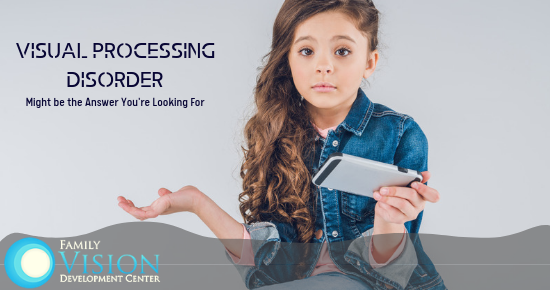Unlike problems that involve actual eyesight or sharpness of vision, visual processing disorders affect how visual information is processed by the brain. A child may have 20/20 vision, but still struggle with processing things like symbols, pictures or distances. Visual processing disorders can hinder a child’s ability to learn properly in the classroom and can also present challenges while playing sports or socializing with peers, all of which can have a negative effect on their self-esteem.
Signs of Visual Processing Disorder
There are certain signs or symptoms to watch for that would indicate that a child may have trouble with visual processing. These could include:
- Difficulty distinguishing between similar letters, shapes or objects.
- Difficulty distinguishing a figure from its background
- Tendency to skip lines when reading, or read the same line over and over
- Trouble writing within the lines, copying from a book or bumping into things when walking
- Trouble remembering what they’ve seen or read
- Difficulty determining how close objects are to each other
- Difficulty identifying an object when only parts of the object are showing
- Frequent reversal of numbers, letters or words
- Organization problems
- Untidy handwriting
- Poor retention of visual classroom material
Vision Therapy is One Treatment Option
Vision therapy is a kind of physical therapy for the visual system which includes the eyes and brain, and can produce successful results for correcting visual processing disorders. In-office, one-on-one vision therapy treatments can improve visual processing speed, visual memory, visual-motor integration and more in order to improve a child’s visual processing issues and in turn help them to improve in the classroom, on the field, and with their peers.
Family Vision Development Center’s Dr. Martin has focused extensively on vision therapy techniques and applies his expertise and understanding of this form of vision treatment to his clients of all ages. Contact us at 630-862-2020 or click here to schedule an appointment where Dr. Martin can thoroughly evaluate your vision issues and determine the most effective treatment options.
Additional information can be referenced here

